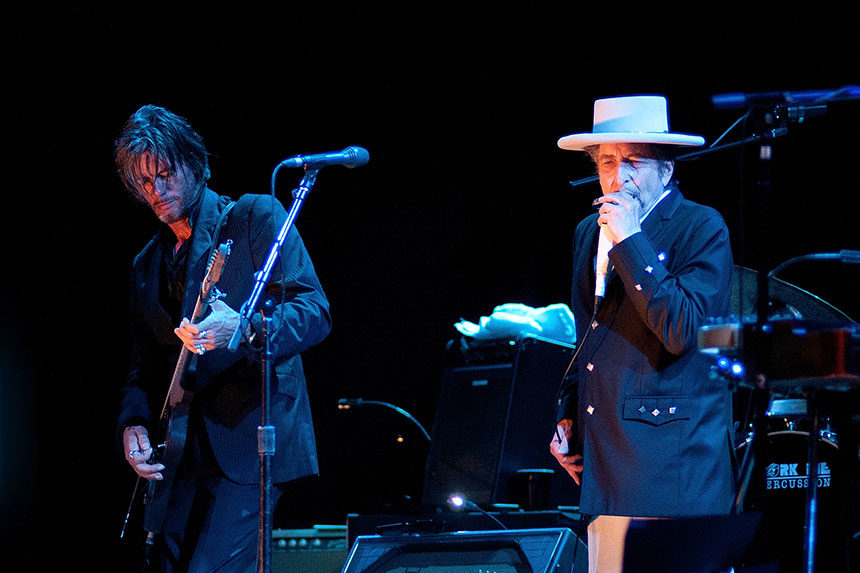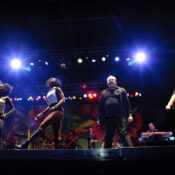Bob Dylan was already familiar with controversy by the time he headlined the Newport Folk Festival in 1965. Two years earlier, the up-and-coming folk star had walked off The Ed Sullivan Show when the network tried to meddle with his set. He tackled civil rights in his songs and backed that up with activism. When Dylan took the stage at Newport, he shocked folk traditionalists by doing something unexpected: he played an electric guitar. While listeners might have known from listening to his records that Dylan was going in that direction, the move still angered some in the folk establishment. It’s no small irony then that Dylan found his career rejuvenated in the 1990s by making the simplest of moves: going unplugged.
Bob Dylan singing “Like a Rolling Stone” (Uploaded to YouTube by Bob Dylan)
Throughout the 1960s, Bob Dylan released classic album after classic album. He was a driver of taking folk into the mainstream and combining it with other forms. Rolling Stone magazine ranked his song “Like a Rolling Stone” as the Greatest Song of All Time. He overcame a motorcycle accident in 1966 to make more classic recordings, appear with Johnny Cash on Cash’s television variety show, and headline the Isle of Wight Festival.
Bob Dylan with The Band from The Last Waltz (Uploaded to YouTube by Movieclips)
The 1970s were up and down for Dylan. Though some reviews were brutal, he created material that’s widely seen as some of his greatest work, like “Hurricane,” “Knockin’ on Heaven’s Door,” and the album Blood on the Tracks. He toured extensively with The Band; their farewell concert in 1976 was documented in the Martin Scorsese film The Last Waltz. Toward the end of the decade, he converted to Christianity and did a trio of albums that were heavily influenced by his turn of faith; 1979’s “Gotta Serve Somebody” from this period won him the Best Male Rock Vocal Performance Grammy.
The Traveling Wilburys’s “End of the Line” (Uploaded to YouTube by The Traveling Wilburys)
Continuing into the next decade, Dylan received more notice and acclaim for collaborations than solo work (in most cases). While his live album with the Grateful Dead, Dylan and The Dead, received negative notices, he was reintroduced to a younger generation as part of “We Are the World.” He also participated in the anti-apartheid anthem “Sun City” and played at Live Aid in Philadelphia in 1985. A casual remark he made on stage that some money should also go to help American farmers led Willie Nelson to launch Farm-Aid. Dylan toured with Tom Petty and the Heartbreakers, and that friendship with Petty was a key to the formation of the Traveling Wilburys, which featured them, George Harrison, Jeff Lynne, and Roy Orbison. His final album of the ’80s, Oh Mercy, received solid reviews.
Bob Dylan performing “Knockin’ on Heaven’s Door” from MTV Unplugged (Uploaded to YouTube by Bob Dylan)
Dylan spent a chunk of the early ’90s doing cover albums of traditional songs. When MTV came calling for Dylan to do an episode of MTV Unplugged, it seemed like a natural. Launched in 1989, the Unplugged program took musicians and put them in an intimate setting with a live audience as they performed (generally) without electric instruments. The format was a big hit for the channel, with several episodes receiving vast critical acclaim while producing albums that sold spectacularly in a number of cases. Among the most celebrated episodes to that point were installments that featured R.E.M., 10,000 Maniacs, Eric Clapton, Mariah Carey, Rod Stewart, Paul McCartney, Pearl Jam, and Nirvana. Dylan recorded his installment over two nights in November of 1994 at Sony Music Studios in New York City.
When the album was released 25 years ago this week, it was an immediate success. It went Gold in the United States, hitting #23 on the album charts; it did even better in the U.K., where it made it to #10. Dylan had considered leaning on covers and traditional tunes, but MTV persuaded him to play his more familiar songs, resulting in something akin to a “greatest hits” package. The irony of the episode and subsequent album is that the man who scandalized the folk world by plugging in had revived his career by unplugging. His next original album, 1997’s Time Out of Mind, was considered an artistic comeback; it was a Top Ten platinum seller in the States and earned him the Grammy for Album of the Year.
“Murder Most Foul” (Uploaded to YouTube by Bob Dylan)
Since that time, Dylan has continued to work, tour, write, and release new and archive material. His Bootleg series, compiling alternate takes and songs left off of albums, has produced many volumes. He’s been given nearly every award you can conceive of, including a Kennedy Center Honor, a Presidential Medal of Freedom, and induction into the Rock and Roll Hall of Fame. On March 26, 2020, he released “Murder Most Foul” on his YouTube channel; it’s a 17-minute song about the Kennedy assassination. Another new song, “I Contain Multitudes,” followed on the channel on April 17.
Dylan’s MTV Unplugged appearance and album represented something a sea change in his career. It introduced him (again) to a younger generation and gave him a launch pad toward creating new and relevant material. He seems to have struck a balance between acclaimed icon and producer of new and relevant work. Whatever the future holds, and however he plays, it’s hard to deny that Dylan has always been electric.
Featured image: Christian Bertrand / Shutterstock.com.
Become a Saturday Evening Post member and enjoy unlimited access. Subscribe now




Comments
I would hardly call this performance Unplugged….I see two plugged in acoustic guitars, a slide guitar and an organ/keyboard amplified. Nevertheless this is an amazing performance, I never tire of watching it.
Bob Dylan Superfan.
Thanks for reading, Bob; I’m glad you enjoyed it.
Since music is one of my most favorite topics, I had to say something on this Bob Dylan feature. It’s wonderful how he’s re-invented himself time and time again. It’s fascinating how some so-called ‘fans’ of certain artists have berated and criticized them for changing with the times, and/or not realizing times are a changing.
I’ve written on the site before how (for example) Robert Plant was lambasted for doing the incredible Honey Drippers album with jazz, Doo-wop and more in the mid-80’s. So un-Led Zep! Glenn Frey too around the same time for his wonderful music and videos in conjunction with ‘Miami Vice’ and Don Henley for his amazing solo work that was nothing like the Eagles. I should say though that the Eagles ’79 album ‘The Long Run’ (in hindsight) showed experimentation (“Those Shoes” for example) foreshadowing their ’80s work to come that utilized electronics and synthesizers.
I love the Eagles. Always have, always will, but their country-rock music of ’70s would not have worked in the drastically different ’80s, and neither would their appearances. Glenn’s ‘You Belong To the City’ is a perfect example of how he was able to live up to his own potential musically, and as a sharp dresser with the perfect clean cut look. A far cry for the better from the dirty, unkempt look of the previous decade. A product of its time, it was fine (and normal) for then. The slovenliness returned in the generic ’90s-present for the unsophisticated masses. Fortunately the revived Eagles didn’t go back in time. They let the new flannel shirt groups have at it, which was fine.
Dylan has always managed to change with the times per this article, and I appreciate the musical videos included here. His latest ‘Murder Most Foul’ I hadn’t heard of until now. Very well written and uniquely Dylan, it was also painful to hear. As a person about as young as you could be (6 1/2 in the first grade that day) to remember it, it’s burned into my memory for life. Rarely does a day ever go by (even in 2020) that I don’t think of it. I’d never seen my parents and adults everywhere so sad, lost and in severe surreal shock for days. Bob Dylan likely thinks of it often too, and created this piece to honor JFK, not sugar-coating what happened. As far as Dylan’s looks go, he’s changed with the times too, but nothing drastic was ever required. I don’t think he would even if it was.